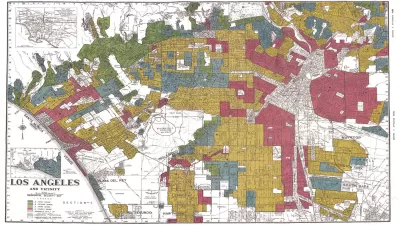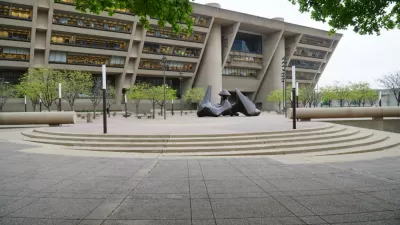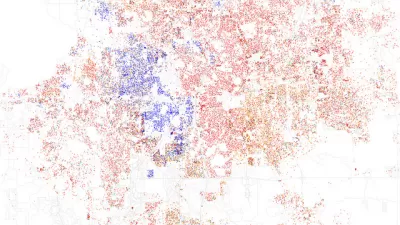Even in liberal states like California, government-sanctioned residential segregation persisted in the 20th century. In a recent talk in L.A., Richard Rothstein, author of The Color of Law, charged planners with undoing this shameful legacy.

"Rothstein's 2017 book The Color of Law, which he discussed at last Friday’s UCLA Extension Land Use Law and Planning Conference, argues that many of the de facto reasons for residential segregation in the United States were in fact de jure reasons. Actual laws and policies passed and implemented by cities, states, and the federal government, not to mention homeowners association bylaws that were often legally sanctioned, prevented African-Americans from living among whites in cities across the country, California included."
"Rothstein attributes this discrepancy largely to African-Americans' former inability to buy homes (or at least to buy homes that appreciated as much as those of their white counterparts). Beyond family economics, Rothstein said that segregation is 'the cause of most of our serious social problems,' including low educational attainment by African-American children forced into segregated, low-quality schools."
"Urban planners are, of course, the ideal audience for Rothstein: they confront the legacy of segregation on a daily basis and they are in a position to do something about it."
FULL STORY: Undoing the Legacy of Segregation in California

Study: Maui’s Plan to Convert Vacation Rentals to Long-Term Housing Could Cause Nearly $1 Billion Economic Loss
The plan would reduce visitor accommodation by 25,% resulting in 1,900 jobs lost.

North Texas Transit Leaders Tout Benefits of TOD for Growing Region
At a summit focused on transit-oriented development, policymakers discussed how North Texas’ expanded light rail system can serve as a tool for economic growth.

Using Old Oil and Gas Wells for Green Energy Storage
Penn State researchers have found that repurposing abandoned oil and gas wells for geothermal-assisted compressed-air energy storage can boost efficiency, reduce environmental risks, and support clean energy and job transitions.

Private Donations Propel Early Restoration of Palisades Playground
Los Angeles has secured over $1.3 million in private funding to restore the Pacific Palisades playground months ahead of schedule, creating a modern, accessible space that supports community healing after recent wildfires.

From Blight to Benefit: Early Results From California’s Equitable Cleanup Program
The Equitable Community Revitalization Grant (ECRG) program is reshaping brownfield redevelopment by prioritizing projects in low-income and environmental justice communities, emphasizing equity, transparency, and community benefits.

Planting Relief: Tackling Las Vegas Heat One Tree at a Time
Nevada Plants, a Las Vegas-based nonprofit, is combating the city’s extreme urban heat by giving away trees to residents in underserved neighborhoods, promoting shade, sustainability, and community health.
Urban Design for Planners 1: Software Tools
This six-course series explores essential urban design concepts using open source software and equips planners with the tools they need to participate fully in the urban design process.
Planning for Universal Design
Learn the tools for implementing Universal Design in planning regulations.
Ascent Environmental
Borough of Carlisle
Institute for Housing and Urban Development Studies (IHS)
City of Grandview
Harvard GSD Executive Education
Toledo-Lucas County Plan Commissions
Salt Lake City
NYU Wagner Graduate School of Public Service





























